Paint Horse Coat Colors
Basic Colors
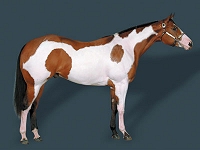
Bay
Genetic Code: E/e or E/E, A/a or A/A
Body colour reddish brown, with variations ranging from dark blood bay to bright bay and usually distinguished by black mane and tail, ear tips, lower legs.
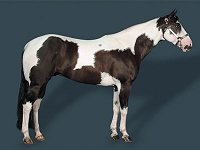
Black
Genetic Code: E/e or E/E
Entire coat, including muzzle, flanks and legs, are black; colour may fade when exposed to the sun; could have rusty tinge during certain times of the year; foals may be an overall mousey grey, then shed to black.
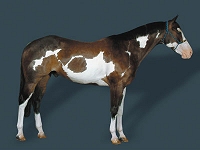
Brown
Genetic Code: E/e or E/E, At/a
Body colour brown or black, with light areas at muzzle, eyes, flank and inside upper legs; mane and tail usually black. Brown is believed to be a variant of the Bay (A) gene and is described as At
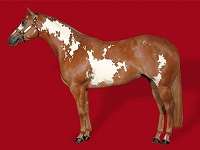
Chestnut
Genetic Code: e/e
Body colour reddish or copper-red; mane and tail usually same colour as body, but may be very dark brown or flaxen which is a golden or off-white colour. (In the USA this colour may be referred to as 'sorrel')
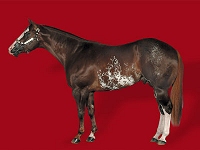
Liver Chestnut
Genetic Code: e/e
Body colour dark red or brownish red; range from light to dark liver chestnut; liver chestnut can be distinguished from or brown by the bronze or copper highlights on the legs; mane and tail usually dark red or brownish red, but may be flaxen which is a silvery colour.
Cream Dilution on Base Colours
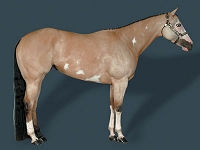
Buckskin
Cream on Bay
Genetic Code: E/e or E/E, A/a or A/A, n/CR
Dilute form of bay, body colour yellowish or gold, mane and tail black; black on lower legs; lacks primitive markings.
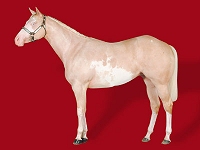
Cremello
Double Cream on Chestnut
Genetic Code: e/e, CR/CR
Double dilute on chestnut resulting in body colour, mane and tail of cream or off-white with pale pinkish skin; the coat has enough yellow hue to allow white markings to be visible; eyes are blue or amber.
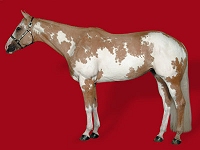
Palomino
Cream on Chestnut
Genetic Code: e/e, n/CR
Diluted body color varying from rich gold to pale yellow; mane and tail generally pale or off-white but may be same color as body (with non-black points).
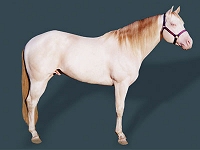
Perlino
Double Cream on Black or Bay
Genetic Code: E/e or E/E, A/a or A/A, CR/CR
Double dilute of bay/brown resulting in body colour of cream or off-white, lower legs, mane and tail light rust or chocolate shade; skin is pinkish or gray; eyes are blue or amber; the coat has enough yellow hue to allow white markings to be visible.
Smokey Black
Cream on Black
Genetic Code: E/e or E/E, n/CR
Cream dilute form of black resulting in charcoal black slightly faded black body colour. This colour is hard to determine from appearance alone. Parentage and genetic testing is required for this colour to be registered.
Dun Dilution on Base Colours
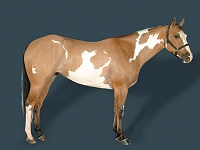
Dun
Dun on Bay
Genetic Code: E/e or E/E, A/a or A/A, + Dn/n
A diluted form of bay, similar in appearance to buckskin with a body colour of yellowish or gold; mane and tail are black or brown; has dorsal stripe and other primitive markings such zebra stripes on legs or shading over withers which are not present on buckskins.
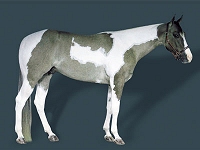
Grullo
Dun on Black
Genetic Code: E/e or E/E + Dn/n
A form of dun with body colour smoky or mouse-colored (not a mixture of black and white hairs, but each hair mouse-colored); mane and tail black; has black primitive markings, may have a visible dorsal stripe.
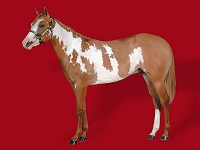
Red Dun
Dun on Chestnut
Genetic Code: e/e + Dn/n
A form of dun with body color yellowish or flesh-colored; mane and tail are red or reddish; has red or reddish primitive markings, will usually have a pronounced dorsal stripe.
Pearl Dilution on Base Colours
Pearl is a caused by a recessive gene closely linked to Cream. A single copy of Pearl (n/Prl) has no effect on the base coat colour. Such horses are referred to as 'Pearl carriers' and may pass the gene on to their offspring. Pearl carriers may have this information marked on their papers. In order for a horse to be true 'pearl' it must carry two copies of the Pearl gene. All Paint Horses carrying Pearl are derived from a Particular line of Barlink horses.
Bay Pearl
Pearl on Bay
Genetic Code: E/e or E/E, A/a or A/A, + Prl/Prl
Black Pearl
Pearl on Black
Genetic Code: E/e or E/E + Prl/Prl
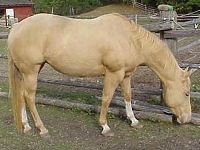
Pearl
Pearl on Chestnut
Genetic Code: Genetic code: e/e + Prl/Prl
Cream-Pearl Dilution on Base Colours
Pearl is also described as a 'Cream activated' gene. When Pearl and Cream combine they produce a pseudo Peal which is different in colour to both Pearl and Cream dilutions. Genetically Pearl and Cream are very closely linked and so can combine together.
Buckskin Pearl
Cream-Pearl on Bay
Genetic Code: E/e or E/E, A/a or A/A, + Cr/Prl
Palomino Pearl
Cream-Pearl on Chestnut
Genetic Code: e/e + Cr/Prl
Smokey Pearl
Cream-Pearl on Black
Genetic Code: E/e or E/E + Cr/Prl
Roan on Base Colours
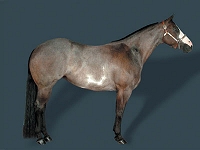
Bay Roan
Genetic Code: E/e or E/E, A/a or A/A, RN
The overall intermingling of white hairs with bay body colour; head, lower legs, mane and tail are usually solid or darker; does not get progressively whiter with age. Roaning may be produced by the sabino coat pattern gene.
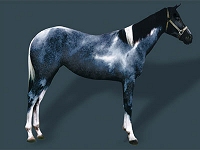
Blue Roan
Genetic Code: E/e or E/E, RN
The overall intermingling of white hairs with a black body colour, head, lower legs, mane and tail are usually solid or darker; does not get progressively whiter with age. Roaning may be produced by the sabino coat pattern gene.
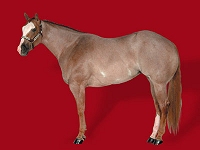
Red Roan
Genetic Code: e/e, RN
The overall intermingling of white hairs with chestnut body color; head, lower legs, mane and tail are usually chestnut or dark red; does not get progressively whiter with age. Roan is a dominant gene and opnly require one roan parent to produce roan offspring.
Grey
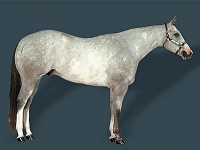
Grey
Genetic Code: Anything + Grey
Dominant over all other colour genes; born any colour with white hair progressively turning the coat whiter as the horse ages; dark skin; normally greys first around eyes and behind ears. This example is a black or bay horse turned grey.
Other Colour Variations
Horses may display or carry any or all of the above coat colours in combination and it is often hard to tell the exact makeup (and therefore what coloured offspring they may produce) without genetic testing. Colours such as 'Dunalino', 'Dunskin' and other combinations of dilutions can produce interesting results.
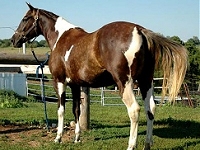
Silver Dapple
Genetic Code: E/e or E/E, n/Z or Z/Z
The Silver Dapple dilution has different effects on different base colours. It affects only black based horses. Red based horses (chestnuts) can be carriers but will not display any characteristics. Some variations are known colloquially in Australia as 'Taffy'. Silver dilution may lighten the body colour, somtimes producing characteristic dapples and will also lighten tails and manes. The extent of the lightening can vary greatly.


